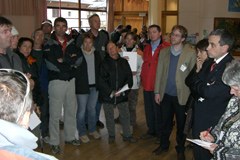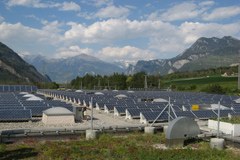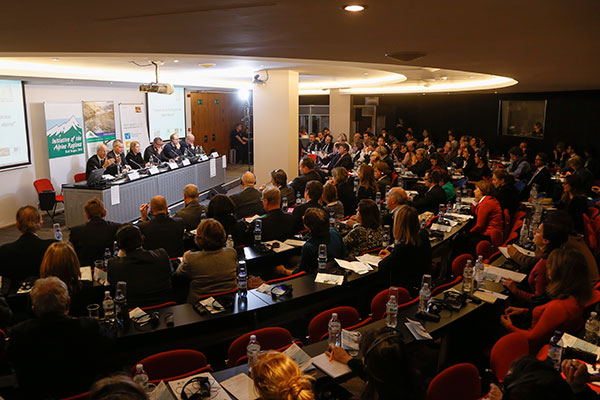Political positions of CIPRA International

Factsheet to the „Eurovignette III“
The International Commission for the Protection of the Alps (CIPRA International) very much welcomes the fact that the EU now intends to set a course that reflects the true costs of transport and is taking a first step by amending Directive 2006/38/EC ("Eurovignette III"). The Directive must also relieve the burden on the Alpine region, which is particularly sensitive ecologically and whose population has to bear particularly high external costs; it must also contribute more to sustainability in freight transport. One important step is a sound directive on transport infrastructure costs, i.e. one that includes the efficient and consistent allocation of all relevant costs. Everyone stands to benefit from its success: the population, with a healthier, safer and better quality of life, and the transport industry, with more reliable transit routes. Indeed, the risks affect the local population as much as they affect those travelling through.

Schaan Memorandum on the Future in the Alps
The future belongs to those who shape it. In the Alps countless initiatives involving thousands of activists are working to do just that. Yet many are unaware of the fact that elsewhere other people are working on precisely the same problems as they are. This is where the Future in the Alps, a project launched by CIPRA, the International Commission for the Protection of the Alps, comes into play. The scope of the project is to collect practical experience throughout the Alps, classify it and make it available to those who need it. It consists of a phase of collating knowledge and good projects, called alpKnowhow, a phase of processing and disseminating it, called alpService, and an implementation phase, called alpPerformance. CIPRA itself is not a research body, nor is it an educational institution; it is a non-governmental organisation, so it is mainly concerned with the questions of what the results of alpKnowhow mean politically and what demands can be derived from these results. To answer these questions CIPRA representatives from seven countries convened in Schaan/Liechtenstein on 8 and 9 December 2006. The demands and political conclusions on all topics are set out in the present Schaan Memorandum on the Future in the Alps.

Resolution: Climate Protection and Climate Change Adaptation Strategies
The Alpine region is particularly affected by global climate changes, many of which are the result of man’s impact. The Alps are a particularly sensitive region and are affected all the more by the forecast changes such as the rise in annual average temperatures, the increase in extreme meteorological events, summer droughts and melting glaciers. It is CIPRA’s view that climate change represents one of the 21st century’s greatest challenges. Given the above it calls upon the European Union, the bodies of the Alpine Convention, all the Alpine states, the federal provinces, regions and cantons as well as all governmental and non-governmental authorities .. to intensify their climate protection efforts in order to reduce the greenhouse effect; .. to draw up sustainable strategies for dealing with the growing repercussions of climate change.
News on Alpine Politics

alpMedia
CIPRA presents pioneers of sustainable living
Lifestyles and economies that use fewer resources require new thinking and action that go beyond narrow limits and consumerism. This is the conclusion of the CIPRA annual conference held in Annecy, France.

Macro-region Alps: get involved!
The European strategy for the Alps could compensate for the shortcomings of the Alpine Convention, says Claire Simon, Executive Director of CIPRA International. Now, during the consultation phase, is an opportunity to participate and demand sustainability.

Alpine policy put to the test
With the development of a macro-regional strategy Europe’s attention is increasingly turned to the Alps – at least for the present. The CIPRA publication SzeneAlpen focuses on the events.

Improvisational Theatre: Macro-Region for the Alps
Is it a comedy, a farce, or a whodunnit? In any case, the subject matter - an Alpine macro-region - is controversial and the cast high-powered. Inspired by the EU, Alpine countries and regions take to the stage while the Alpine Convention assumes the role of input provider.
Standpunkte der CIPRA

alpMedia
Point of view: 25 years of the Alpine Convention are not enough
While we celebrate 25 years of the Alpine Convention, we still bemoan the slow pace of its implementation. For its objectives to be achieved, believes Katharina Conradin, President of CIPRA International, we have to repeatedly demand their realisation.

alpMedia
Point of view: He who sows infrastructure, reaps more traffic
At the end of February 2016 Swiss voters will decide on the building of a second road tunnel at the Gotthard Pass. The CHF 4 billion project will torpedo Switzerland’s modal shift policy, believes Barbara Wülser, CIPRA International’s communications manager.

alpMedia
Point of view: Change begins in the heart
Claire Simon, Executive Director of CIPRA International, used the occasion of the 2015 CIPRA annual conference to call for more engagement with people and their ways of thinking in order to strengthen the natural and cultural diversity of the Alps.